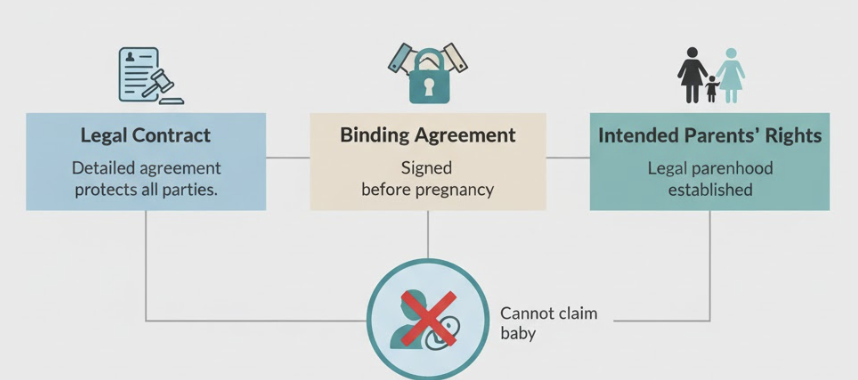

Our Latest Blogs

Myth vs Fact: Surrogacy Misconceptions Debunked
Surrogacy has helped thousands of families around the world achieve their dream of parenthood. Despite its growing acceptance and proven success, surrogacy is still surrounded by myths and misconceptions. Some people believe surrogates are genetically related to the child. Others worry about legality, ethics, or whether surrogates will want to keep the baby.
Misinformation can cause unnecessary fear, stigma, and hesitation for intended parents who are already navigating an emotional journey. This article separates fact from fiction, explaining the realities of surrogacy in a clear and neutral way. By debunking common myths, we aim to provide clarity and confidence to anyone considering surrogacy—whether as an intended parent, surrogate, or supportive friend.
Myth 1: Surrogacy is Only for the Wealthy
The Myth: Surrogacy is often portrayed as an option available only to celebrities or extremely wealthy families. Media headlines about high-profile cases reinforce this stereotype.
The Fact: While surrogacy does involve financial costs, it is not reserved for the elite. Many intended parents come from ordinary backgrounds. Costs vary widely depending on the country, the clinic, and the services required (such as donor eggs, multiple IVF cycles, or international arrangements).
In some regions, altruistic surrogacy is permitted, where surrogates are reimbursed for expenses rather than paid a large fee.
Financing options, grants, or insurance coverage may help families manage expenses.
Clinics provide transparent breakdowns of costs so intended parents can plan realistically.
Surrogacy is not inexpensive, but it is increasingly accessible to families of different financial backgrounds.
Myth 2: The Surrogate is the Baby’s Mother
The Myth: Many assume the woman carrying the baby is also the child’s biological mother.
The Fact: In gestational surrogacy—the most common and widely accepted form—the surrogate has no genetic link to the baby. The embryo is created using the egg and sperm of the intended parents, or donors, through IVF. The surrogate’s role is to provide a safe and healthy environment for the pregnancy, not to contribute genetics.
Traditional surrogacy, where the surrogate’s own egg is used, is rare and often not legally permitted. Clinics and agencies almost exclusively practice gestational surrogacy today to protect the rights and clarity for all parties.
Myth 3: Surrogates Want to Keep the Baby
The Myth: A common fear among intended parents is that the surrogate may become emotionally attached and try to keep the baby.
The Fact: This scenario is extremely rare due to several safeguards:
Surrogates undergo extensive psychological evaluations before being accepted. They are emotionally prepared and understand their role.
Legal contracts make clear that the surrogate has no parental rights.
Surrogates are typically women who already have their own children and want to help others experience parenthood.
Most surrogates describe the experience as empowering and joyful. Their motivation is compassion, not a desire to expand their own families.
Myth 4: Surrogacy is Illegal Everywhere
The Myth: Some believe surrogacy is universally banned.
The Fact: Laws vary by country, but surrogacy is legal and regulated in many places.
Permissive countries: The United States (in certain states), Canada (altruistic), Ukraine, Georgia, and a few others allow surrogacy under clear frameworks.
Restricted countries: Some, like the UK and Australia, allow only altruistic surrogacy, meaning no large payments beyond expenses.
Prohibited countries: Nations such as France and Germany currently ban surrogacy entirely.
Because of these differences, intended parents often choose to work with international clinics that provide safe, legal options with strong protections.
Myth 5: Children Born via Surrogacy are Different
The Myth: Some people assume children born through surrogacy may face health issues or social stigma.
The Fact: Medically, babies born via surrogacy are just as healthy as other children. IVF, embryo transfer, and pregnancy management are closely monitored by professionals, often with more medical attention than typical pregnancies.
Socially, awareness and acceptance of surrogacy are growing worldwide. Many children grow up proud of their unique birth stories, knowing they were deeply wanted and loved even before they were born.
Myth 6: Surrogacy Exploits Women
The Myth: Critics argue that surrogacy takes advantage of vulnerable women.
The Fact: Ethical surrogacy programs are built on voluntary participation, informed consent, and fair treatment. Key safeguards include:
Comprehensive medical and psychological screening.
Independent legal representation for surrogates.
Transparent compensation (where permitted) or expense reimbursement.
Emotional support throughout pregnancy.
Most surrogates report positive experiences, expressing pride in helping families. Exploitation concerns are valid only in unregulated or illegal settings, which is why choosing a reputable clinic is essential.
Myth 7: Surrogacy Guarantees a Baby
The Myth: Some intended parents assume surrogacy always results in a baby.
The Fact: While surrogacy significantly increases chances of success, no medical procedure can offer 100% certainty. Factors such as embryo quality, surrogate health, and natural biological variability influence outcomes.
IVF success rates per cycle vary, often between 40–60% depending on age and health factors.
Multiple attempts may be necessary.
Clinics work to maximize success by using advanced technologies like preimplantation genetic testing (PGT) and optimizing surrogate care.
Surrogacy is one of the most reliable paths to parenthood, but realistic expectations are essential.
Myth 8: Intended Parents Have No Control During Pregnancy
The Myth: Some fear that once the surrogate is pregnant, intended parents are excluded from the process.
The Fact: Intended parents are encouraged to be as involved as possible. While the surrogate maintains autonomy over her health, parents often:
Attend medical appointments (in person or virtually).
Receive regular updates and ultrasound images.
Build a positive relationship with the surrogate.
Are present at the birth.
The process is collaborative, with clinics and coordinators facilitating communication.
Myth 9: Surrogacy is Against Nature or Religion
The Myth: Some argue surrogacy is unnatural or morally unacceptable.
The Fact: Views on surrogacy differ across cultures and religions. However, many faith leaders and communities recognize it as an act of generosity and compassion when approached ethically. Scientifically, surrogacy is simply another way of supporting human reproduction, much like IVF or organ donation.
Families who choose surrogacy do so out of love and the desire to nurture a child—values that are universally respected.
Myth 10: Surrogacy is Too Complicated to Consider
The Myth: The combination of medical procedures, legal steps, and emotional aspects makes surrogacy seem overwhelming.
The Fact: While surrogacy is complex, working with an experienced clinic simplifies the process. Intended parents receive guidance at every step, from initial consultation to legal parentage after birth. Dedicated coordinators, legal experts, and counselors ensure no one navigates the journey alone.
With the right support system, surrogacy becomes not only manageable but also deeply rewarding.
The Truth About Surrogacy
Surrogacy is surrounded by myths, but the facts tell a different story. It is a safe, ethical, and increasingly accessible option for building families. Surrogates are not the baby’s mother. They rarely want to keep the child, and with proper legal and medical frameworks, the process protects everyone involved.
Children born through surrogacy are healthy, loved, and cherished. Far from being exploitative, ethical surrogacy programs empower women to make informed, voluntary choices to help others. And while it requires careful planning, surrogacy is far from impossible—with expert guidance, it can be one of the most fulfilling experiences of your life.
👉 If you are considering surrogacy, contact our clinic today. Our team of medical professionals, legal advisors, and compassionate coordinators will answer your questions, dispel your concerns, and guide you every step of the way.

FAQ: How Involved Can We Be During the Pregnancy?
One of the most emotionally significant parts of the surrogacy journey is the pregnancy itself. For many intended parents, a central question is:
“How involved can we be while the surrogate is pregnant?”
The answer? It depends — but in most cases, far more than you might expect.
Modern surrogacy isn’t just a medical process — it’s a partnership built on communication, trust, and shared purpose. At Yuzko Medical Center, we design every journey to be inclusive, legally sound, and emotionally meaningful for both surrogate and intended parents.
In this article, we’ll explore:
What types of involvement are possible
How communication is managed
What’s allowed or restricted by law
How cultural and geographical factors affect involvement
Tips for maintaining a healthy, respectful relationship
The Surrogacy Relationship: A Team Effort
While the surrogate is carrying the child, you remain an essential part of the journey. From medical milestones to emotional check-ins, many opportunities exist for involvement — both virtually and in person.
The key is mutual agreement and clear expectations.
Communication: Staying Connected
Regular Updates
Most surrogates are happy to share pregnancy updates via:
Text messages or email
Video calls or phone chats
Weekly or monthly update check-ins
Sharing ultrasound images, doctor reports, and baby bump photos
At Family, we assign a case coordinator to facilitate communication and translation if needed — especially in international cases.
Video Calls and Emotional Support
Many intended parents schedule video calls:
After key appointments (e.g., heartbeat confirmation, anatomy scan)
Before major holidays or personal dates
To offer encouragement and express gratitude
Respectful involvement builds emotional trust — which is linked to better psychological outcomes for all.
Medical Involvement: What You Can Expect
Depending on location and clinic protocols, you may be able to:
Attend embryo transfer (in person or virtually)
Join key ultrasounds (especially anatomy scan at 20 weeks)
Receive real-time medical updates
Participate in birth planning
Be present in the delivery room (with surrogate’s and clinic’s consent)
In Ukraine and similar jurisdictions, intended parents are legally recognized and typically granted access to medical updates, as long as privacy laws are respected.
International Surrogacy: Are There Limitations?
In cross-border surrogacy (e.g., if you live in the US, UK, or EU but your surrogate is in Ukraine or Georgia), direct involvement can be limited by:
Visa/travel restrictions
Language barriers
Time zone differences
Medical center policies
Still, even from afar, parents remain engaged via:
Scheduled video reports
Recorded ultrasound videos
Bilingual coordinators and translation services
Periodic on-site visits (optional)
Emotional Involvement: What Surrogates Appreciate
Most surrogates value being acknowledged as partners in the process. Small gestures go a long way:
Thank-you notes or supportive messages
Celebrating pregnancy milestones (e.g., trimester completions)
Gifts or symbolic tokens (if allowed by law and contract)
❗ Always check with your agency before offering gifts, to ensure compliance with surrogacy laws and ethical guidelines.
Being Present for the Birth
One of the most powerful moments in surrogacy is the delivery day. Here’s how involvement typically works:
You are invited to be in the delivery room (if allowed and agreed upon)
You meet the baby immediately after birth
You can skin-to-skin bond with your child from the first hour
You are included in newborn care and hospital registration
Legal documentation is usually pre-prepared to recognize you as the legal parents from the moment of birth.
Boundaries and Legal Considerations
Each surrogacy contract outlines:
How and how often you’ll communicate
What types of updates you’ll receive
Whether you can attend medical appointments or delivery
Your rights and responsibilities as intended parents
At Yuzko Medical Center, all arrangements are clearly discussed and written into the contract before embryo transfer.
What We Recommend
Voices From the Journey
“Even though we were in Germany and our surrogate was in Ukraine, we felt included in every step. We watched ultrasounds live, cried together during the heartbeat scan, and were in the hospital when our son was born. It felt like family.”
— Anna & Max, Intended Parents, 2023
Final Thoughts
Surrogacy is more than a medical contract — it’s a shared human journey. While the surrogate carries your child, you carry the hope and love that made this possible in the first place.
Being involved in the pregnancy—emotionally, logistically, legally—builds the foundation for a meaningful experience for everyone involved.
At Yuzko Medical Center, we guide you through each step, ensuring that your role is active, your bond with the baby is nurtured, and your relationship with the surrogate is respectful and supportive.
Because even if you’re not carrying the baby, this is your pregnancy too.

FAQ: What If the Surrogate Changes Her Mind?
If you are considering surrogacy, you may already feel a mix of excitement and nervousness. For many intended parents, one of the most common and deeply emotional concerns is: “What happens if the surrogate changes her mind and decides to keep the baby?”
Surrogacy is built on trust, contracts, and careful planning—but it is also an intimate human journey. The fear of losing parental rights can feel overwhelming, especially for those who have already faced years of infertility, failed treatments, or medical challenges.
The good news is that situations where surrogates try to keep the child are extremely rare. Professional surrogacy programs put in place multiple safeguards—legal, psychological, and medical—to prevent such disputes. Still, the answer depends heavily on where the surrogacy takes place, because surrogacy laws vary dramatically worldwide.
In this article, we break down the legal realities, international differences, protections available, and practical steps you can take as intended parents to minimize risk and feel secure throughout your journey.
Can a Surrogate Legally Keep the Baby?
The legal answer depends on the jurisdiction:
United States
In surrogacy-friendly states like California, Nevada, Illinois, the law is clear: surrogacy contracts are enforceable, and intended parents are recognized as legal parents before or immediately after birth.
Surrogates in these states cannot keep the child once agreements and pre-birth orders are finalized.
In contrast, some U.S. states have no legislation or ban surrogacy entirely. In those states, disputes could be more complicated.
United Kingdom
Surrogacy is legal but only on an altruistic basis. Surrogacy contracts are not enforceable.
By law, the surrogate is considered the legal mother at birth, regardless of genetics.
Intended parents must apply for a Parental Order to transfer legal parenthood.
If the surrogate refuses, courts decide based on the best interests of the child. While the law theoretically allows a surrogate to keep the baby, in practice, courts usually favor the intended parents, especially if the child is genetically related to them.
Canada
Surrogacy is altruistic, and contracts are only partially enforceable.
Technically, the surrogate is the legal mother at birth. Legal parentage is transferred by court order.
If a surrogate refuses, courts again prioritize the child’s welfare and the intentions of the parties involved.
Ukraine and Georgia
Both countries are considered among the most surrogacy-friendly.
Commercial surrogacy is legal, and intended parents are recognized as the only legal parents from the moment of conception.
The surrogate has no parental rights. Her name never appears on the birth certificate, and she cannot legally keep the child.
Other Countries
In countries where surrogacy is unregulated or banned (e.g., France, Germany, Italy, India, Cambodia), intended parents may face significant risks. Contracts may not be recognized, and parental rights may be contested or denied entirely.
Summary: Whether a surrogate can legally keep the child depends almost entirely on the legal system. In regulated countries like Ukraine, Georgia, and certain U.S. states, the risk is virtually zero. In altruistic systems (UK, Canada), legal processes may allow disputes, but courts usually side with intended parents.
How Common Is This Situation?
The fear is common—but actual disputes are rare. Several factors explain why:
Screening: Surrogates undergo medical and psychological evaluations to ensure they understand the process and are emotionally prepared.
Motivation: Most surrogates are women who have already had children and do not want to raise more. They are motivated by empathy, not by the desire for another baby.
Contracts and counseling: Legal contracts and counseling sessions clearly establish that the child belongs to the intended parents.
Statistics: While highly publicized cases occasionally appear in the media, they represent a tiny fraction of surrogacy journeys worldwide. The vast majority proceed without conflict.
What Happens If a Surrogate Does Change Her Mind?
In surrogacy-friendly jurisdictions (Ukraine, Georgia, California):
The surrogate has no legal grounds to keep the child. Intended parents are recognized from birth, and the law protects their rights.In altruistic but regulated systems (UK, Canada):
Initially, the surrogate is the legal mother. If she refuses to sign over parental rights, courts intervene. While delays and stress are possible, most cases end with the intended parents gaining custody, especially if the child is genetically theirs.In unregulated or banned countries:
The situation is far more complicated. Intended parents may struggle to gain recognition, face custody battles, or even risk being unable to bring the child home. This is why experts strongly recommend avoiding unregulated destinations.
What Legal Protections Exist to Prevent Disputes?
Legally binding contracts (where recognized): These set out rights and responsibilities, surrogate compensation, and intentions regarding parentage.
Pre-birth or post-birth parentage orders: Courts can declare intended parents as legal parents either before the child is born (pre-birth order) or after birth.
Birth certificates: In some jurisdictions (Ukraine, Georgia), intended parents are listed directly on the birth certificate.
Independent legal counsel: Both surrogate and intended parents should have their own lawyers to ensure fairness.
Agency guidance: Reputable agencies educate surrogates thoroughly and provide continuous support to prevent misunderstandings.
What Psychological Safeguards Are in Place?
Counseling sessions: Surrogates are required to undergo psychological screening to confirm emotional readiness.
Discussion of expectations: Topics such as bonding with the baby, separation after birth, and the surrogate’s motivation are explored in advance.
Ongoing emotional support: Throughout the pregnancy, surrogates receive counseling to manage stress, reinforce boundaries, and ensure confidence in their role.
These safeguards greatly reduce the risk of a surrogate regretting her decision later.
What Should Intended Parents Do If They Are Worried?
Research carefully: Choose a country and program with strong legal protections for intended parents.
Ask direct questions: Before signing, clarify: Will you be listed on the birth certificate? Are contracts enforceable? What is the legal process for parentage?
Build trust: Establish open communication with your surrogate. A strong, respectful relationship makes disputes even less likely.
Work with professionals: Use established clinics, agencies, and lawyers who specialize in surrogacy.
Prepare for contingencies: Even in the safest jurisdictions, plan for possible delays in paperwork or court hearings.
Real-Life Example: Baby M Case (USA)
The most famous surrogacy dispute was the Baby M case in New Jersey (1986–88). A traditional surrogate (who was genetically related to the child) refused to give up the baby. The court ultimately gave custody to the intended father (the genetic parent) but granted visitation rights to the surrogate.
Since then, most countries and U.S. states have moved toward gestational surrogacy only, precisely to avoid such conflicts. In gestational surrogacy, the surrogate has no genetic link to the baby, which makes disputes less likely and legally weaker.
Reassurance for Intended Parents
The idea that a surrogate might change her mind is one of the greatest fears for intended parents—but the numbers show it is more myth than reality. In regulated countries, the law protects intended parents, and disputes are virtually nonexistent. In altruistic systems, while surrogates technically have initial parental rights, courts overwhelmingly support the transfer of custody to intended parents.
The most important protections are:
choosing the right jurisdiction;
working with experienced professionals;
ensuring strong legal contracts;
prioritizing open communication and trust.
By taking these steps, intended parents can approach surrogacy with confidence, knowing that the chances of a surrogate keeping the baby are extremely low.




